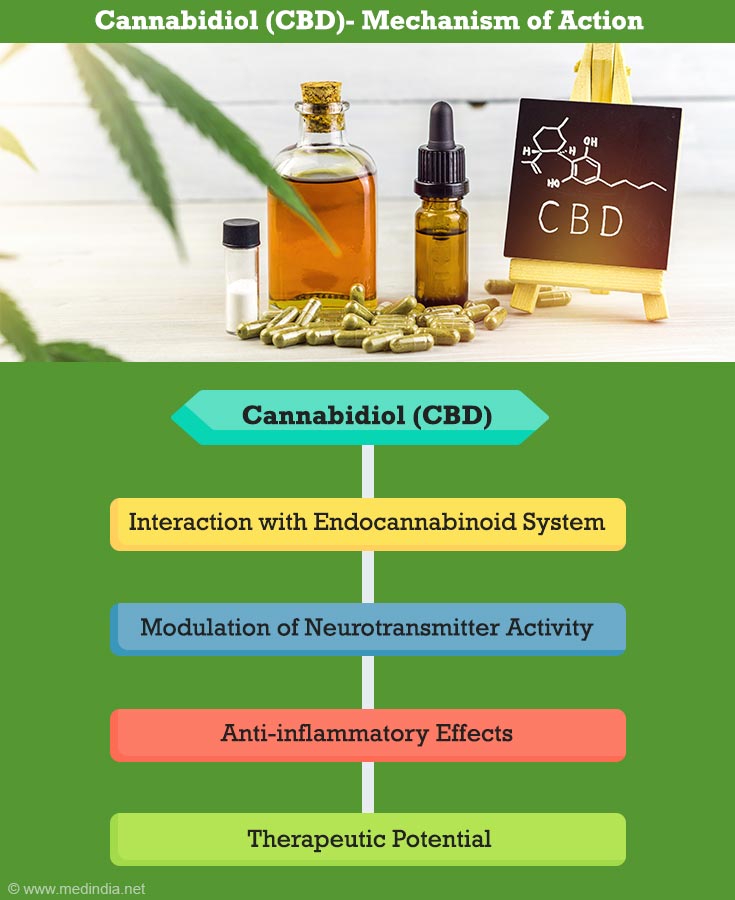- Cannabis - (https://www.who.int/teams/mental-health-and-substance-use/alcohol-drugs-and-addictive-behaviours/drugs-psychoactive/cannabis)
- The Name of Cannabis: A Short Guide for Nonbotanists - (https://pubmed.ncbi.nlm.nih.gov/28861494/)
- Phytochemical and genetic analyses of ancient cannabis from Central Asia - (https://pubmed.ncbi.nlm.nih.gov/19036842/)
What is Cannabidiol?
Cannabidiol, or CBD, stands out among over a hundred cannabinoids found in cannabis plants. CBD doesn't make you high like Tetrahydrocannabinol (THC) does. It has many health benefits, such as reducing anxiety, managing pain, and fighting inflammation.
THC, the psychoactive compound in marijuana, holds its own therapeutic potential, particularly in pain management and appetite stimulation for medical purposes. However, its recreational use is where THC gains notoriety for its euphoric effects(1✔ ✔Trusted Source
Cannabis
Go to source).
Cannabidiol Structure and Forms
CBD is available in different forms, including tablets, oral solutions, syrups, and more. The choice of form depends on individual preferences and the intended therapeutic purpose. Each form may have varying bioavailability, influencing the onset and duration of its effects.
FDA Regulation of Cannabidiol
Although the FDA has approved certain CBD-based medications, unregulated products flood the market. Consumers must be cautious and prioritize products from reputable sources to ensure quality and safety(2✔ ✔Trusted Source
The Name of Cannabis: A Short Guide for Nonbotanists
Go to source).
What are the Functions of Cannabidiol?
Pain Relief: Cannabidiol possesses analgesic properties and may help alleviate pain by interacting with neurotransmitters and reducing inflammation.
Anxiety and Stress Reduction: Cannabidiol may manage anxiety and stress by modulating serotonin receptors in the brain, promoting a sense of calmness and relaxation(3✔ ✔Trusted Source
Phytochemical and genetic analyses of ancient cannabis from Central Asia
Go to source).
Anti-Inflammatory Effects: Cannabidiol has anti-inflammatory properties, potentially beneficial for conditions characterized by inflammation, such as arthritis and inflammatory bowel diseases.
Neuroprotection: CBD shows promise in protecting neurons from damage and degeneration, potentially offering therapeutic benefits for neurodegenerative disorders like Alzheimer's and Parkinson's disease.
Seizure Control: Cannabidiol reduces the frequency and severity of seizures in individuals with epilepsy, especially in forms resistant to conventional treatments.
Sleep Regulation:CBD may regulate sleep patterns and improve sleep quality by interacting with receptors involved in the sleep-wake cycle and reducing anxiety-related sleep disturbances.
Skin Health: Cannabidiol's anti-inflammatory and antioxidant properties make it beneficial for skincare, potentially reducing acne, eczema, and other inflammatory skin conditions.
Heart Health: CBD may have cardioprotective effects by reducing blood pressure, inflammation, and oxidative stress, thereby lowering the risk of cardiovascular diseases.
Mood Regulation: Cannabidiol stabilizes mood and alleviates symptoms of depression by influencing serotonin levels and interacting with brain receptors involved in mood regulation.
Nausea and Vomiting Relief: CBD reduces nausea and vomiting, particularly in individuals undergoing chemotherapy or experiencing motion sickness.
Did You Know?
Research has found that CBD can effectively treat seizures, especially in specific types of epilepsy. Many studies have shown good results, leading to the FDA approving Epidiolex, a CBD medicine, for treating certain seizures.CBD Interactions and Cannabidiol Mechanism of Action
Cannabidiol interacts with the endocannabinoid system, a complex network of receptors involved in regulating various physiological processes. Its modulation of neurotransmitter activity and anti-inflammatory effects contribute to its therapeutic potential.

Benefits of CBD
Pain Relief: CBD has been reported to alleviate various types of pain, including chronic pain, neuropathic pain, and inflammatory pain.
Anxiety and Depression Management: Studies suggest that CBD may help reduce symptoms of anxiety and depression by interacting with serotonin receptors in the brain.
Neuroprotective Properties: CBD has shown promise in protecting neurons from damage, potentially benefiting individuals with neurological disorders such as Parkinson's disease and epilepsy.
Anti-inflammatory Effects: CBD exhibits anti-inflammatory properties, which may help mitigate inflammation associated with conditions like arthritis, inflammatory bowel disease, and multiple sclerosis.
Seizure Control: Epidiolex, a CBD-based medication, has been approved by the FDA for the treatment of certain types of epilepsy, particularly Dravet syndrome and Lennox-Gastaut syndrome.
Sleep Improvement: Some individuals report improved sleep quality and reduced insomnia symptoms with CBD use.Did You Know?
Studies suggest that cannabinoids in hemp may have broader applications than previously thought. Research indicates that compounds like CBG and CBN could potentially treat conditions such as glaucoma and Alzheimer's disease. This suggests hemp's therapeutic potential extends beyond pain relief, paving the way for new medical discoveries.Limitations of CBD
Limited Research: While there is growing interest in CBD's therapeutic potential, research on its long-term effects and efficacy for certain conditions is still limited.
Variability in Product Quality: The CBD market is largely unregulated, leading to variability in product quality, potency, and purity. Some products may contain contaminants or inaccurate CBD concentrations.
Potential Side Effects: While CBD is generally considered safe, some individuals may experience side effects such as fatigue, diarrhea, changes in appetite, and interactions with certain medications.
Legal and Regulatory Issues: CBD's legal status varies by jurisdiction, and regulations regarding its production, sale, and use are evolving. This can lead to confusion and uncertainty for consumers and businesses alike.
Individual Variability: CBD's effects can vary significantly from person to person, depending on factors such as dosage, method of administration, individual biochemistry, and underlying health conditions.
Risk of Misinformation: Due to the popularity of CBD and its association with cannabis, there is a risk of misinformation and exaggerated claims about its benefits, leading to confusion among consumers.
Cannabidiol Risks and Cannabidiol Side Effects
Despite its potential benefits, this formulation is not without risks.
Adverse Effects: Users of CBD products have reported experiencing side effects such as fatigue, changes in appetite, and diarrhea. These effects may vary in severity and duration depending on individual factors.
Interactions with Medications: CBD may interact with certain medications, including prescription drugs and over-the-counter supplements. This interaction can affect the metabolism of these medications in the body, potentially leading to adverse effects or reduced efficacy.
Importance of Medical Supervision: It is crucial for individuals, especially those with pre-existing health conditions or taking medications, to seek medical supervision before using CBD products. Healthcare professionals can assess potential risks and provide personalized recommendations based on individual health profiles.
Monitoring for Adverse Reactions: Individuals using CBD should monitor themselves for any adverse reactions or changes in symptoms. If experiencing any unexpected side effects, it is advisable to discontinue CBD use and consult a healthcare professional promptly.
Dosage Considerations: Proper dosage and administration of CBD are essential to minimize the risk of adverse effects. Starting with a low dose and gradually increasing as needed, under medical supervision, can help mitigate the potential for side effects.
Quality and Purity of Products: Consumers should prioritize purchasing CBD products from reputable manufacturers known for quality and transparency. Ensuring that products undergo third-party testing for potency and purity can help mitigate the risk of contamination or adulteration.
Individual Sensitivity: Individuals may have varying sensitivities to CBD, and what works well for one person may not be suitable for another. It's essential to be mindful of individual responses and adjust CBD usage accordingly.
Long-Term Effects: While short-term use of CBD may be generally well-tolerated, the long-term effects of CBD use are not yet fully understood. Continued research is needed to evaluate the safety and efficacy of prolonged CBD usage.
Cannabidiol Warnings and Cannabidiol Precautions
Pregnant, breastfeeding individuals, and those on certain medications should be cautious about using CBD. Adequate research and consultation with healthcare professionals are essential to address potential concerns and ensure safe consumption.
Summary
Various CBD products flood the market, ranging from oils and tinctures to gummies, capsules, and more. Understanding the diversity of available products allows consumers to choose the most suitable form for their needs. Quality and transparency in sourcing are crucial considerations when selecting the right products.
The world of Cannabidiol is vast and dynamic, offering a spectrum of potential benefits for individuals seeking natural alternatives to traditional medications. To use Cannabidiol safely, it is important to make informed choices. It is also important to work with healthcare professionals.
Additionally, it is important to be responsible in navigating the changing world of cannabis products. As research progresses, we expect to learn more about how CBD can improve human health and well-being.
"To use Cannabidiol safely, it is important to make informed choices."
Disclaimer: The information provided in this article is for educational and informational purposes only. It is not intended as medical advice or a substitute for professional medical diagnosis, treatment, or guidance. Always consult with a qualified healthcare provider before starting any new treatment or making changes to existing ones.










